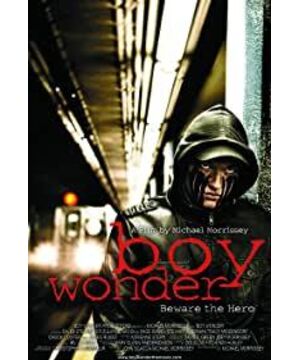I just finished watching "The Revengeful Boy" released in 2012, and found that the ending was somewhat "unexpected, but reasonable", so I wrote down my feelings in time, and I would like to share it with you.
First of all, I have to say that this film is very good in terms of subject matter, effect, performance and narrative structure. If I were to rate it, I would give it a score of 9.3-9.5, especially the finishing touch at the end, which is thought-provoking. The story told in the film is simple and clear: the protagonist's name is Sean. When he was 8 years old, he encountered an accident while going out with his parents. His father was knocked out and his mother was killed. But his insistence on identifying the murderer was overruled by his father, which resulted in the murderer (Childs) getting away with impunity. Since then, the trajectory of his life has changed. He became taciturn, but studious and excellent, and at the same time did not forget to exercise and learn boxing. After obtaining the sheriff's charter to get access to criminal information, he looked for opportunities to "hunt" them one by one. In the end he killed his father and the murderer who was in prison.
The most discussed place in this film is: "Is Sean's father an accomplice of the murderer?" I think it is not subjectively, but objectively, the main reasons are as follows:
1. Let's talk about the last poisoning issue first. Almost all film critics agree that the back of the stamp is poisonous, but someone mentions the issue of evidence recovery, so I want to ask, whether Childs put a red stamp or a black stamp, the other stamp is very likely to stay beside him. And if you are a policeman, the inmate in the prison dies, and there is an extra stamp on your body that has just arrived, would you think of going for a test? So there's reason to believe (plus the close-up of Childs licking the envelope to make it stick together in the film), it's very likely that the poison was smeared on the envelope so that Childs would die anyway. At the same time, since the letter was sent back, he recovered the evidence perfectly.
2. Assuming that it is true that the back of the stamp is poisonous, but the adhesive bond of the envelope is not, then it is basically certain that the back of the red stamp is poisonous, but the black one is not. But it's definitely not a question of being "pardoned" if Childs used black stamps. Please think about it, even if Sean's father is an accomplice subjectively, after so many years he has quit drinking and staying away from his friends, and at the same time deeply repented of his previous behavior and life, shouldn't Sean also Forgive him? Then why do you have to kill the killer in the end? The only thing that can be explained is that Sean will definitely kill this child who has no blood relationship and is ruthless, so there is no question of "pardoning" and "non-pardoning".
3. In order to ensure that Childs can be killed without leaving any evidence, then Sean must be absolutely sure that Childs will choose the red stamp. From the lonely look on Childs's face at the end, it can be guessed that he made the right choice, plus Sean's unsurprising expression after receiving the letter, it can be roughly affirmed that Sean's father was not subjectively involved in his wife's murder. Eun also knows this.
4. However, the connivance of Sean's father objectively became an accomplice. It's quite possible that Sean's father signed a large sum of money when he was out fooling around, and the gang leader gave him the idea to kill his wife for a huge compensation to pay off the debt. Sean's father would certainly not agree at the time, but was shaken by the gang's intimidation and offered to give him a period of consideration. On the night of the murder, the murderer said "time's up", which should mean that the time for you to consider is over, and immediately killed his wife. After the incident, Sean's father simply did not do anything to keep the matter down. On the one hand, his wife was dead and he could get a lot of money; He acquiesced to what happened, and objectively became an accomplice.
In addition, the violence in Sean's family repeatedly appeared during the film, which makes it easy to think that Sean's father is one of the murderers, but from the director's overall thinking, the answer will definitely not be so obvious, so I am also One reason for judging that it was not one of the murderers. But such a large-scale domestic violence scene can pave the way for Sean's father's suggestion to the gang leader to be shaken.
View more about Boy Wonder reviews











